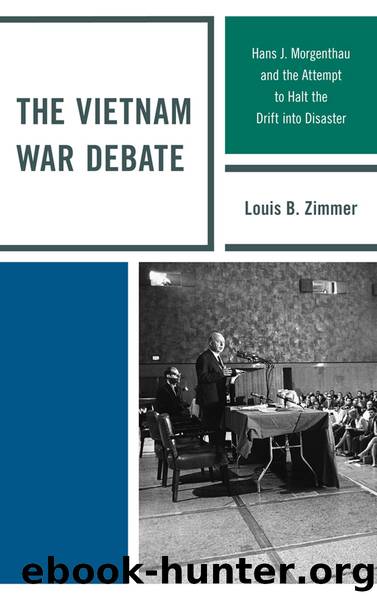The Vietnam War Debate by Zimmer Louis B.;

Author:Zimmer, Louis B.;
Language: eng
Format: epub
ISBN: 862635
Publisher: Lexington Books
âTo make all-out war seem an unattractive courseâ! The understatement is indeed baffling, and so is the perverse logic on which it is based. Could either limited nuclear warâlet alone all-out nuclear warâever be considered anything but horrendous and a calamity from which, in all likelihood, there could be no recovery? In a much-abbreviated version of Nuclear Weapons, Kissinger published, in 1958, a sixty-two page paperback in which he summarized the need for an increased military defense capability this way: âThe willingness to engage in nuclear war, when necessary, is part of the price of our freedom.â21
Three years later, in a September 1961 Commentary article titled âDeath in the Nuclear Age,â Morgenthau writes: âTo defend freedom and civilization is absurd when to defend them amounts to destroying them. To die with honor is absurd if nobody is left to honor the dead.â What is Morgenthauâs answer to what he calls the possibility of âuniversal destruction,â which âsignifies the simultaneous destruction of tens of millions of people, of whole families, generations, and societies, of all things they have inherited and created . . . their visible achievements, and therefore reducing the survivors to barbarism?â The only answer is through diplomacy. He writes: âAs all-out war is tantamount to suicide, so successful diplomacy provides the only certain chance for survival.â He adds: âA nation which under present conditions is either unwilling or unable to take full advantage of the traditional methods of diplomacy condemns itself either to the slow death of attrition or the sudden death of atomic destruction.â22
The members of Kissingerâs study group who contributed to Kissingerâs Nuclear Weapons and Foreign Policy included Hamilton Fish Armstrong and McGeorge Bundy. Listed as officers and directors of the Council were Armstrong, John J. McCloy, David Rockefeller, and CIA Director Allen Dulles among others; a âcommittee on studiesâ included Armstrong, Gordon Dean, Chairman of the Council, Columbia University President Grayson Kirk, and Harvard historian William L. Langer, among others. Gordon Dean wrote the forward to Nuclear Weapons, which contains these words: âWe believe that on this fast-shrinking globe our freedom is somehow bound up with the freedom of all people and particularly of those who have it today or are determined to have it some day.â23 Thus, here on the first page of this book, is the kind of abstract theorizing about an abstract freedom that has nothing to do with the problem of making foreign policy in the nuclear age or, for that matter, in any age.
The roster of participants and Council members among the Rockefeller Special Projects Study that led to Kissingerâs 1958 paperback titled Prospect for America: The Rockefeller Panel Reports included Nelson Rockefeller, Governor of New York, listed as Chairman of the panel; Henry Luce, editor-in-chief of Time, Life, and Fortune; Dean Rusk, then president of the Rockefeller Foundation; Gordon Dean, noted earlier and listed here as senior vice-president, ânuclear energy, General Dynamics Corporationâ; Chester Bowles, former Ambassador to India; and Edward Teller, professor of physics at Berkeley and director of the University of California Radiation laboratories.
Download
This site does not store any files on its server. We only index and link to content provided by other sites. Please contact the content providers to delete copyright contents if any and email us, we'll remove relevant links or contents immediately.
| Africa | Americas |
| Arctic & Antarctica | Asia |
| Australia & Oceania | Europe |
| Middle East | Russia |
| United States | World |
| Ancient Civilizations | Military |
| Historical Study & Educational Resources |
The Dawn of Everything by David Graeber & David Wengrow(1690)
The Bomber Mafia by Malcolm Gladwell(1618)
Facing the Mountain by Daniel James Brown(1544)
Submerged Prehistory by Benjamin Jonathan; & Clive Bonsall & Catriona Pickard & Anders Fischer(1450)
Wandering in Strange Lands by Morgan Jerkins(1416)
Tip Top by Bill James(1408)
Driving While Brown: Sheriff Joe Arpaio Versus the Latino Resistance by Terry Greene Sterling & Jude Joffe-Block(1363)
Red Roulette : An Insider's Story of Wealth, Power, Corruption, and Vengeance in Today's China (9781982156176) by Shum Desmond(1348)
Evil Geniuses: The Unmaking of America: A Recent History by Kurt Andersen(1339)
The Way of Fire and Ice: The Living Tradition of Norse Paganism by Ryan Smith(1323)
American Kompromat by Craig Unger(1306)
It Was All a Lie by Stuart Stevens;(1294)
F*cking History by The Captain(1289)
American Dreams by Unknown(1277)
Treasure Islands: Tax Havens and the Men who Stole the World by Nicholas Shaxson(1252)
Evil Geniuses by Kurt Andersen(1248)
White House Inc. by Dan Alexander(1206)
The First Conspiracy by Brad Meltzer & Josh Mensch(1167)
The Fifteen Biggest Lies about the Economy: And Everything Else the Right Doesn't Want You to Know about Taxes, Jobs, and Corporate America by Joshua Holland(1115)
